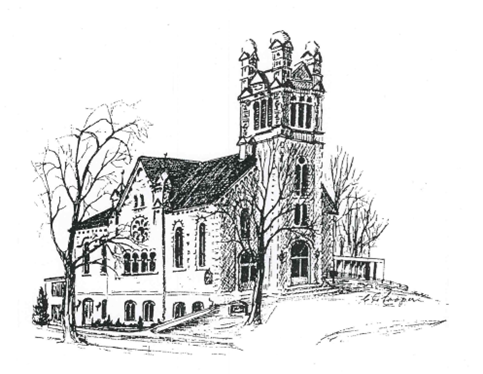Acknowledging Grief
November 10, 2024 | Rev. John Young
Readings: II Samuel 1:17-27; Psalm 71; John 15:12-17
The reading from II Samuel recounts David’s deep, passionate grief at the deaths of Saul and his three sons, including Jonathan, the son of Saul to whom David was so close. They, along with many others, had been killed in a battle with the Philistines at Mount Gilboa as the army of Israel sought to defend their homeland.
We might wonder at David’s expression of grief. After all, while the prophet Samuel had earlier, and secretly, anointed David as king, Saul was still king and had continued to rule. Now Saul was dead. David’s chief barrier to assuming the throne was now gone. Further, David had had nothing to do with Saul’s death. So, was David just “faking it,” here, pretending to be grief-stricken, when in reality he could hardly help being pleased that significant problem he faced had been removed? I do not think so. While we live in a time when political life and posturing can make us cynical, I think David’s grief here, grief for both Saul and Jonathan, was real. In the reality and the inner depths from which David grieved and expressed his grief, I think there is something for us to learn about how we acknowledge and express grief, both privately and publicly.
Remembrance Day, of course, is not about military success or prowess. It is about an expression, a public expression, of grief, though the day can involve very personal grief, for example, for those who served with the Canadian forces in Afghanistan and for their families. Thinking about such grief, and how we acknowledge and express it, will be the subject of this week’s sermon. David’s expression of such grief at the deaths of Saul and his three sons, especially Jonathan, offers us some insight for doing so.
A Sense of Community
November 3, 2024 | Rev. Dr. John H. Young
Readings: Genesis 25:7-18; Psalm 24; Luke 6:20-31
Lists of names, sometimes lengthy lists of names, are something you come across from time to time as you read through the Bible. These lists, sometimes with hard-to-pronounce names, can often make us pause briefly, before skipping over the list to get on with the story. For those of us who do try to make our way through the names, we can find our eyes beginning to glaze over. Yet, none of these lists are there by accident. Matthew’s Gospel, for example, opens with an eighteen-verse genealogy running from Abraham to Jesus, including, of course, King David as one of Jesus’ ancestors. In Luke, chapter 3, we find a genealogical account that begins with Jesus and goes back to “Adam, son of God.” Generally speaking, most of us do not linger long over these genealogies.
But the reading this Sunday from Genesis includes a list of Ishmael’s sons. Why, we might well wonder. This list of names is set in a section of a chapter that recounts the deaths of Abraham and of Ishmael. We know that this list of names circulated orally for centuries before the list, and the rest of the material we find in Genesis, was written down. So folks in ancient Israel thought that remembering these names was important, so important that the list was passed down orally for centuries before assuming written form, probably in the sixth century BCE. Why was this listseen as so important that it was passed down? I may be wrong, but I think the list of Ishmael’s sons was to remind the descendants of Isaac of this part of their heritage and of their connection to the descendants of Ishmael, who, like Isaac, was a child of Abraham. Ishmael is understood to be the ancestor of several Arab tribes and also of the prophet Muhammad.
But what might this passage from Genesis, a passage recounting the deaths of Abraham and of Ishmael, have to say to us, or to remind us, in our time? That is the subject I want to address in the sermon.
Thinking About a New Covenant
October 27, 2024 | Rev. Dr. John H. Young
Readings: Jeremiah 31:31-34; Psalm 46; Romans 3:21-31
The prophet Jeremiah did not have a happy life. The book of Jeremiah is, in many ways, a book without much good news. Jeremiah predicts the destruction of the city of Jerusalem and expresses, on God’s behalf, God’s displeasure with much of what has been going on in Judah. Particular displeasure is expressed with both the religious and the political leadership of Judah. Yet there is a two chapter section in Jeremiah—chapters 30-31—that have a different tone. These two chapters, sometimes known as the “book of comfort” or the “book of consolation,” speak of a different and much more hopeful future for the people of Judah who now (at the point when these two chapters are written) find themselves in exile in Babylon. God promises them a new covenant, one different from the covenant God established with their ancestors with the giving of the Ten Commandments at Mount Sinai. This new covenant will be based on divine forgiveness, moving away from a covenant that the people understood to be based on a system of rewards and punishments.
In the sermon, I want to look at some of the aspects of that covenant, for understandings of it have had significant influence in Christianity, not least from the way this passage from Jeremiah gets interpreted in the letter to the Hebrews. Some aspects of that “new covenant” from Jeremiah have particular relevance when we think about some of the historic emphases of Protestantism coming out of the Reformation.



